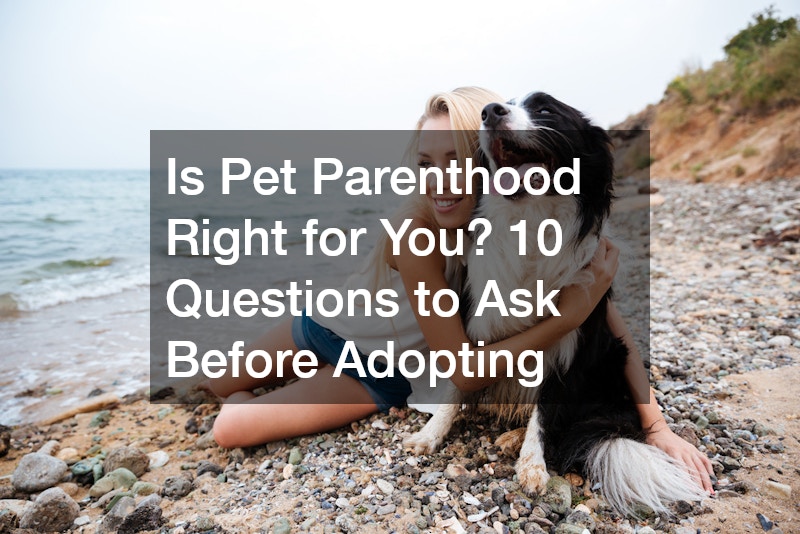
Adopting a pet is a rewarding experience that brings joy, companionship, and unconditional love into your life. However, fur parenting is also a significant responsibility that demands thoughtful consideration. Before you make this life-changing decision, take the time to ask yourself these ten essential questions to determine if you’re truly prepared to welcome a pet into your home and heart.
1. Are You Ready for the Responsibility?
One of the most important aspects of pet ownership is the responsibility it entails. Pets are not just adorable companions; they require constant care, attention, and commitment.
Time Commitment:
Pets need daily care, including feeding, walking, grooming, and health maintenance. If you’re not prepared for the level of involvement, pet ownership can feel overwhelming. Animals like dogs require consistent exercise and mental stimulation, while cats and smaller pets might need less, but still require time and attention.
Long-Term Responsibility:
A pet is typically a long-term commitment, often lasting over a decade. Dogs, for instance, can live 10-15 years, and cats often live even longer. When adopting a pet, you need to consider whether you can provide for their needs for the duration of their life. This commitment extends beyond just the initial excitement of adopting—they rely on you for their well-being every day.
2. Can You Afford the Costs?

Owning a pet comes with significant financial responsibilities, and it’s important to understand all the costs involved before adopting. Pets can bring joy, but their care can quickly add up.
Initial Costs:
Adoption fees can vary from $50 to $300 or more, depending on the pet type and breed. You’ll also need to budget for essential supplies like food dishes, bedding, collars, and crates. Additionally, vaccinations, microchipping, and spaying or neutering are typically required, which adds to the initial expenses.
Ongoing Expenses:
Pets require regular care, including food, veterinary visits, grooming, and medical treatments. For example, food can cost $20 to $60 a month, and routine veterinary visits can range from $100 to $200 annually. Regular flea and tick prevention, vaccinations, and heartworm treatments add to the ongoing costs.
Unexpected health issues may arise, and domestic animal medical care can be expensive, with some procedures costing hundreds or even thousands of dollars. Pet health insurance or an emergency fund is a good idea to manage these expenses.
Unexpected Costs:
In addition to regular costs, pets can incur unexpected expenses, such as emergency medical bills or property damage. Having an emergency fund or insurance plan is essential to cover these unforeseen costs, ensuring you’re financially prepared for anything that comes your way.
By considering these costs upfront, you’ll be better prepared for the financial commitment involved in pet ownership, ensuring a happy and healthy life for your new companion.
3. Do You Have the Time for a Pet?
Time is another key factor in deciding whether pet ownership is suitable. Pets, especially dogs, require a significant amount of your time each day.
Daily Care:
Dogs need to be walked multiple times a day, regardless of weather or personal schedule. Similarly, feeding schedules, litter box cleaning, and playtime are important. If you work long hours or travel frequently, a pet may struggle with loneliness and may become anxious or develop behavioral issues.
Work-Life Balance:
Think about your work-life balance. Pets need consistent care, and you might need to adjust your schedule to meet their needs. For those with busy careers or who travel often, pet ownership might be challenging without a support system, such as a pet sitter or family member who can step in when you’re away.
4. Is Your Household Ready for a Pet?

Pets are not just a personal responsibility; they can have a significant impact on everyone in the household. Before bringing a pet into your home, it’s important to ensure that everyone is prepared for the change and that your living environment can accommodate the new addition.
Family Agreement:
It’s crucial to discuss the decision with everyone in your household. This is especially important if you have children or other pets. Younger children may not yet be able to take on daily pet care tasks or fully understand the boundaries required for responsible pet ownership.
A pet will also affect the household dynamics, so everyone should be on board with the idea and understand the commitment involved in caring for an animal. When all members of the household are involved in the decision-making process, the pet’s arrival will be less disruptive and more enjoyable for everyone.
Other Pets:
If you already have pets, it’s important to consider how they will react to a new addition. Pets, especially dogs, can be territorial, and introducing a new pet to the household can cause stress or tension if not handled carefully.
Be sure to properly introduce your new pet to your existing pets, observing their behavior and allowing them to adjust gradually. Some pets may take time to warm up to one another, so patience and supervision are key during the initial stages of the introduction.
Managing Pet Health in Your Household:
A pet’s health can also affect your household. For instance, fleas and ticks are common pests that can affect both pets and humans. It’s important to maintain proper flea & tick control to ensure your home stays clean and healthy for everyone. Regular treatments for your pet, along with maintaining a clean environment, will help keep pests at bay and prevent them from spreading throughout your home.
5. Do You Have Enough Space?
The amount of space available in your home plays a critical role in determining if pet ownership is a good fit. Larger pets, particularly dogs, often require ample space to roam and exercise, especially if they belong to energetic or large breeds.
Size of Your Home:
If you live in a smaller apartment or house, adopting a larger breed might not be the best option. Small pets like cats or small dogs are generally more adaptable to living in compact spaces. However, even smaller animals need adequate space to move freely and play.
It’s important to assess whether your living situation provides enough room for your pet to feel comfortable. For example, a dog will need a designated area to sleep and space to stretch out. Even cats benefit from having enough room to explore, climb, and play. Before adopting a pet, ensure your space can accommodate their needs without feeling overcrowded.
Outdoor Access:
For dog owners, access to outdoor space, such as a backyard or nearby park, is vital for exercise and mental stimulation. Dogs need daily walks, playtime, and time outside to stay healthy and happy. Without enough outdoor access, your pet may become frustrated, leading to behavioral issues.
If you live in a space without direct access to a yard, consider how you’ll provide regular exercise through walks or nearby parks. If you’re in an area with limited outdoor space, you may need to be more creative in ensuring your pet stays active and engaged.
Creating a Play Area:
For active pets, especially dogs, it’s essential to have a designated play area where they can engage in physical activity and burn off energy. If you don’t have a yard, consider setting up an indoor play area with toys and interactive games to keep them entertained.
If you do have outdoor space, creating a secure play area can be beneficial. This could involve building a fenced-in area where your pet can run freely. If you need assistance in constructing such a space, local welders can help you install durable, safe fencing or gates to ensure your pet is contained and protected while playing outdoors.
6. Can You Make Your Home Pet-Friendly?

Creating a pet-friendly home is essential for ensuring your new furry friend feels safe and comfortable while protecting your belongings. Pet-proofing your living space should be a priority as part of the adoption process.
Safety Considerations:
Start by identifying potential hazards in your home that could harm your pet. Secure or remove sharp objects, electrical cords, or any toxic plants that might be within your pet’s reach. If you’re adopting a dog, you may need to install gates to block off dangerous areas or secure trash cans to prevent curious paws from causing a mess.
Additionally, check areas like your garage or outdoor spaces for hazards. If you have garage doors, ensure they are properly maintained to avoid accidents, as pets can sometimes sneak into these areas. Hiring a reliable garage door repair service can help you address any issues and keep these spaces safe for your pet.
Creating a Comfortable Environment:
Pets thrive when they have their own designated spaces. Set up a cozy area with a bed or blanket where your pet can rest comfortably. Designate separate zones for eating and playing, ensuring their food and water bowls are easily accessible. Provide engaging toys and activities to keep them entertained, reducing the chances of them becoming destructive out of boredom. A well-organized and welcoming environment helps pets adjust to their new home and builds their sense of security.
7. Can You Clean After Your Pet?
Cleaning up after a pet is an unavoidable part of pet ownership. No matter how well-trained your furry companion is, they will create messes, and maintaining a clean home requires effort and consistency.
Regular Grooming:
Shedding is a common issue with many pets, particularly dogs and cats. Depending on the breed, shedding can range from light to heavy. Regular brushing can help minimize fur accumulation, but you’ll still need to vacuum your floors and furniture frequently to keep your home free of pet hair and allergens.
Enlisting the help of a local pet groomer can be invaluable in maintaining your pet’s coat, reducing shedding, and keeping them clean, which ultimately makes cleaning your home easier.
Accidents and Cleanliness:
Even the most well-trained pets can have accidents, especially during their early days in a new home. Puppies might need time to learn potty training, while cats may occasionally track litter out of their boxes. Quick cleanups are vital to prevent stains, odors, and bacteria buildup.
For more stubborn messes, such as those on carpets or rugs, investing in rug steam cleaning services can help restore your flooring to its original state and maintain a hygienic living environment.
Long-Term Maintenance:
As pets age, additional cleaning challenges may arise. Older dogs might have accidents due to health issues, and cats could develop litter tracking problems or shed more heavily. Being prepared to manage these changes with the right tools and services ensures your home remains clean and comfortable for everyone.
8. Can You Handle Potential Behavioral Issues?
Pets aren’t always perfectly behaved from the start, and addressing behavioral challenges is a crucial part of responsible pet ownership. Being prepared for these hurdles ensures a smoother relationship with your new companion.
Training Needs:
Many pets, especially young ones like puppies, require dedicated training to learn proper behavior. Common issues include chewing on furniture, barking excessively, and struggles with potty training.
Cats, on the other hand, may scratch furniture, climb where they shouldn’t, or engage in other unwanted activities. Consistent training and appropriate tools, like scratching posts for cats or chew toys for dogs, can help curb these behaviors.
Managing Behavioral Issues:
More serious behavioral problems, such as aggression or separation anxiety, require additional time and effort. Professional training or behavior therapy might be necessary to address these challenges effectively.
For instance, if a dog exhibits signs of aggression, understanding the triggers and working with a specialist can prevent future incidents. In extreme cases, aggressive behavior could lead to risks for you or others. If such situations occur and harm arises, consulting an animal attack injury attorney might be necessary to understand your rights and responsibilities.
9. What Is Your Plan for Travel or Vacations?

If you travel frequently, having a well-thought-out plan for your pet’s care during your absence is essential. Whether you’re taking short trips or extended vacations, your pet’s well-being should be a top priority.
Pet Sitters or Boarding:
When traveling, you may need to rely on a pet boarding facility or a trusted pet sitter to look after your furry friend. Boarding options, such as boarding kennels, provide a safe environment where pets are fed, exercised, and monitored in your absence.
However, it’s crucial to research these facilities to ensure they are reputable, clean, and staffed with trained professionals. Some pets adjust well to boarding, while others may struggle with the change in routine, so consider your pet’s temperament before deciding.
Traveling with Your Pet:
If you prefer to bring your pet along, assess their comfort with travel. While some pets, especially smaller dogs and cats, can adapt to being on the move, others may experience stress or anxiety during trips. Invest in travel essentials like carriers, calming aids, and familiarity with pet-friendly accommodations to make the journey smoother.
For longer vacations or trips that aren’t pet-friendly, having a trusted plan for care ensures your pet is happy and safe while you’re away.
10. Are You Prepared for the Emotional Commitment?
Pet ownership is an emotional journey that requires love, patience, and understanding. The bond between you and your pet will grow over time, but it can also come with challenges.
Emotional Investment:
Pets become part of the family, and you must be prepared for the emotional attachment. They offer unconditional love, but they also need care and attention, which can sometimes feel like an emotional burden. Recognizing this emotional commitment before adopting can help ensure you’re ready for what’s ahead.
Dealing with Loss:
Unfortunately, pets don’t live forever. Part of being a pet parent is accepting that one day, your beloved companion may pass away. This can be emotionally taxing, and it’s important to be prepared for the eventual emotional toll that comes with the end of their life.
In Closing
Adopting a pet is a lifelong commitment that should not be taken lightly. By asking yourself these ten essential questions, you can better assess whether fur parenting is right for you. Pets bring joy and companionship, but they also require time, effort, and financial investment. If you’re ready to make that commitment, the rewards will be immense, offering a deep bond and love that enriches both your life and theirs.
